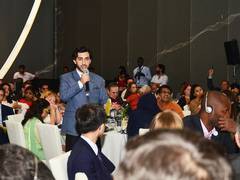
GCED Basic Search Form
Quick Search
Usted está aquí
Noticias

Over 200 senior education policy-makers, experts, as well as youth advocates in the field, from close to 70 countries came together in New Delhi, India, from 19 to 20 September, for the first “UNESCO International Conference on the Prevention of Violent Extremism through Education: Taking Action”.
Participants, concerned by the global rise in attacks perpetrated by violent extremist groups, came together to seek a common understanding about how education systems can appropriately and effectively take action.
For many participants, it requires addressing controversial issues in a responsible way, in and out of school through formal and non-formal education, and ensuring that education systems, as a whole, are mobilized and equipped to face the challenge.
“Young people are […] the main targets of recruitment strategies of extremist groups and fall victim to its violence”, said Mr Gwang-Jo Kim, the Director of the UNESCO Bangkok Office, speaking on behalf of The UNESCO Director–General. “If we rely exclusively on hard power to find solutions, we will not tackle the many underlying conditions that breed violent extremism and drive youth to join violent extremist groups.” “We also risk losing a generation of youth to despair and disengagement.”
Priority areas of action
The Conference, co-organized by UNESCO Headquarters and the UNESCO Mahatma Gandhi Institute of Education for Peace and Sustainable Development (MGIEP), generated concrete ideas on the way forward by identifying priority areas of work relating to educational content, teachers, learning environments and the need for more and better partnerships.
These recommendations underlined the need to invest in prevention efforts, understanding that it requires vision, a long term and sustained commitment to change, as well as strong leadership at every level of education systems until results can be seen.
More specifically, participants emphasized the importance of removing content which fuels anger, stereotypes and prejudice from educational materials. This was deemed critical to provide learners with a safe space for open dialogue on sensitive issues in schools.
The importance of supporting teachers - as educators, change agents and mediators - was also highlighted in order to ensure that schools and the broader community work with a common goal. This implies investing in relevant pre- and in-service training, as well as appropriate psycho-social support to teachers who are victims of violent extremism.
Because schools can unfortunately also be places where violence is learned, education personnel need to implement and enforce inclusive educational policies that allow girls and boys alike to feel safe, empowered and confident that they belong to the learning community. Inclusion is also fundamental to nurture solidarity among learners and reinforce their resilience against violent extremist messaging.
Finally, participants underscored the educational value of effective partnerships with other education stakeholders and sectors, such as youth groups, law enforcement officers committed to prevention work, social workers, the media, faith-based organizations, and families.
An important feature of the event was the Talking Across Generations on Education (TAGe) session which had 50 youth delegates from across the world engage in a free dialogue on the prevention of violent extremism. The lively discussion, which was moderated by acclaimed educator, author and activist Irshad Manji, concluded with the launch of MGIEP’s Knowledge Commons, an online dialogue-driven platform.
Follow-up activities
The Conference concluded with a commitment to follow-up activities:
UNESCO’s Guide for Policy-Makers on the Prevention of Violent Extremism through Education will be finalized on the basis of the suggestions of the Conference and made available in English and French by the end of the year with other languages to follow.
UNESCO will ensure that Conference participants stay connected and networked and will further develop its Online Clearinghouse on Global Citizenship Education with educational materials that support the prevention of violent extremism.
Capacity building activities, in cooperation with key partners will also be launched to equip policy-makers, teachers and educators with appropriate tools that can support effective prevention efforts.
Finally, MGIEP committed to facilitating the global dialogue on critical issues and recommended the development of digital learning tools and platforms to serve as safe spaces for dialogue. Highlighting the need to mainstream youth voices in policy-making, the institute will support the development of a youth-led guide to PVE.
The conference was organized with the support of the OIF, the Kingdom of Saudi Arabia, provided by the Saudi Delegation to UNESCO and the U.S. Department of State.
